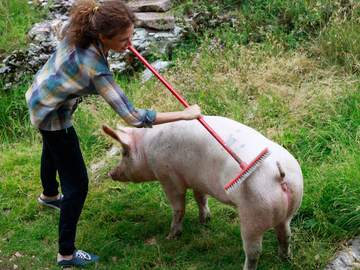
‘Hogwash’
Hogwash spiked in lookups last week, after the Prime Minister of Israel used it in an appearance on the NBC show Meet the Press.
Israeli Prime Minster Benjamin Netanyahu on Sunday pushed back on claims that Israel is breaking international law in its war with the militant group Hamas, calling such arguments “hogwash.”
— Miranda Nazzaro, The Hill, 12 Nov. 2023
In modern use (which is less frequent than it used to be) hogwash typically means “nonsense.” When the word first came into English, in the the 15th century, it had a somewhat more literal meaning: hogwash was the common term for the garbage or slops that were mixed with water, or sour or skimmed milk, and fed to pigs. In the 17th century the word was also applied to weak inferior liquor or any worthless stuff. Following this, the word came to be used for worthless art, writing, or ideas (especially in American use).
‘Dictator’
Dictator also spiked in lookups, after President Biden used the word to describe the Chinese President.
The highly-anticipated meeting between President Joe Biden and Chinese President Xi Jinping has been overshadowed by Biden's comments calling Xi a “dictator” after the two leaders met on the sidelines of the Asia-Pacific Economic Cooperation in San Francisco on Wednesday.
— Britt Clennet, ABC News, 16 Nov. 2023
The sense in which dictator is most often used today (and the one apparently intended by Biden) is “one ruling in an absolute and often oppressive way.” The word has also been used in literal fashion (“one who says or reads something for a person to transcribe or for a machine to record; one that dictates”), and has a historical use (not often encountered these days), meaning “one appointed by the senate of ancient Rome and granted absolute emergency power.”
‘Vermin’
Vermin had a very busy week, after Donald trump used the word in reference to his political opponents.
Trump told a rally in New Hampshire on Saturday he would “root out the communists, Marxists, fascists and the radical left thugs that live like vermin within the confines of our country that lie and steal and cheat on elections,” repeating his false claim that fraud cost him the 2020 presidential election.
— Nathan Layne, Reuters, 13 Nov. 2023
Vermin comes from the Latin word for worm (vermis), and was initially applied to animals (“small common harmful or objectionable animals (such as lice or fleas) that are difficult to control”) and now is sometimes found applied to people (see above). The equating of groups of people with vermin was seen by many as reminiscent of language used by Adolf Hitler, who made similar comparisons about the Jewish people as a means of dehumanizing them.
‘Citizen’s arrest’
Donald Trump caused another word to spike in lookups last week when he wrote about seeing a judge and prosecutor placed under citizen’s arrest.
Trump Posts Fan ‘Fantasy’—Incitement That Fraud Trial Judge and AG Letitia James Be Placed Under ‘Citizen’s Arrest’
— (headline) Mediaite, 14 Nov. 2023
We define citizen’s arrest as “an arrest made not by a law officer but by a citizen who derives authority from the fact of being a citizen.” Under common law, a citizen may make an arrest for any felony actually committed, or for a breach of the peace committed in their presence.
Words Worth Knowing: ‘Bêtise’
Our word worth knowing this week is bêtise, defined as “an act of foolishness or stupidity.” Don’t let the circumflex (ê) scare you away from using this lovely and useful word; it sounds like bay-TEASE. You do not need any knowledge of French to pronounce the word, and its usefulness is universal.
For all their disagreements and misunderstandings and incompatibilities, they're all attempting to make peace with the cosmic bêtise of existence, to figure out how to live without compromising everything they value.
— Charles Arrowsmith, The Boston Globe, 21 May 2023




